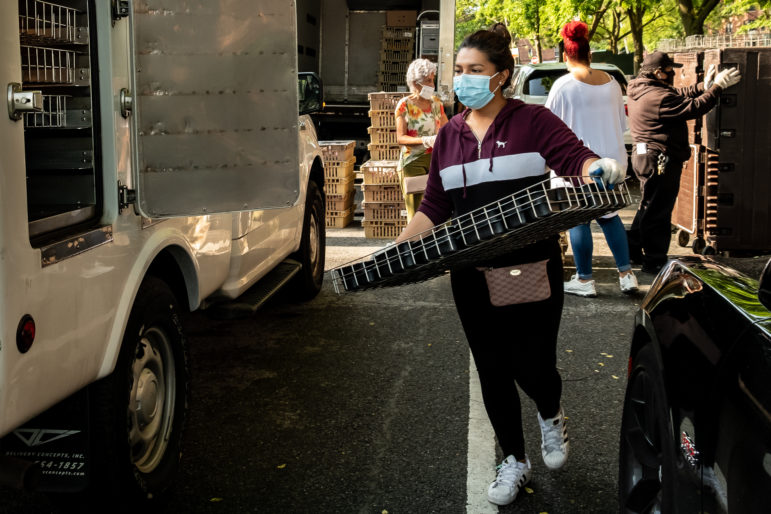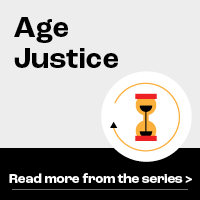
Adi Talwar
On a recent Wednesday morning in Forest Hills, Queens Community House’s Margarita Tapia Hernandez loaded a delivery van with meals.New enrollees in NYC’s home-delivered meals program for seniors will temporarily be redirected to the city’s emergency food program, which was set up during the COVID crisis. But advocates for the aging and some seniors believe the city’s emergency meals don’t have the diversity of offerings or nutritional quality of meals offered by the existing delivery program for seniors, and the program doesn’t provide any of the social supports the older program offers.
“The city is rightfully and understandably spending so much money and attention on emergency food but in this instance, it’s to the detriment of the current and well-established, and very effective and efficient meals on wheels program that exists already,” says Allison Nickerson, Executive Director of the group LiveOn NY.
Prior to the COVID outbreak, the Department for the Aging’s home-delivered meals (HDM) program was serving 17,000 homebound seniors. That number increased by 10 percent when the state shut down to curtail the outbreak in March, DFTA says. In May, the agency told some HDM providers to direct new enrollees to Get Food NYC, an emergency food initiative under the leadership of newly appointed Food Czar Kathryn Garcia.
Nickerson says, based on photos she’s seen of Get Food NYC meals, they aren’t nutritionally appropriate for older people, especially those who are getting most of their nutrients from delivered food.
66-year old John Chen, in Forest Hills, is one such resident receiving meals through Get Food NYC, the city’s emergency food program. He is a senior who was not enrolled in HDM prior to COVID-19. Chen says he has received four deliveries so far from the program, each with about three days worth of food.
His first delivery consisted of nine meals of corn with beef. His second delivery was bread, with ham and cheese, and his third delivery consisted only of snack bars and potato chips. “Basically, it’s like a snack. It’s not like a meal,” Chen said of this third delivery.
His fourth delivery had more variety, with meals of dry noodles, potato and beef, pasta sauce, tuna and apples. The lack of variety was an issue for Chen, who was surprised he was receiving shipments of nine of the same meal at once. He said the meals lacked nutritional value, and he is still regularly making grocery runs for fresh fruits and vegetables. He was at the grocery store when he was reached by City Limits.
“As a senior in this critical moment, somebody delivering food to my house, I really really appreciate it,” Chen says, praising the city’s effort in making the needed deliveries. “My only concern is to deliver food variety, instead of everything just one type, that would be better,” he says, adding, “I really don’t like the snacks, because I have diabetes. I don’t eat sweet stuff.”
The program, Get Food NYC, was set up by the city’s Human Resources Administration and is delivering meals to hundreds of locations across the five boroughs. It provides more overall meals than the HDM, three each day, seven days a week, whereas HDM provides one meal, five days a week.
The city has experienced a swell of need for food delivery across the city during the pandemic, both due to economic stressors and a greater need for isolation among vulnerable populations, including seniors. That has caused HDM providers to be stretched thin. DFTA says this is why they are telling HDM providers who have reached their contracted capacity to direct new enrollees to Get Food NYC. Larger HDM providers that did not reach their contracted limit prior to COVID will continue to keep enrolling new members, DFTA says.
While providers don’t believe the existing network of HDM contractors could absorb the enormous need during COVID 19, they expressed frustration that the city chose not to add to their funding so they could take on more clients.
“I don’t understand why the city chose to roll out a whole new program without including providers who have historically been providing food to older adults and community for decades,” said Ben Thomases, Executive Director of Queens Community House, a HDM provider.
Thomases says that since Get Food NYC has taken on more senior clients who would otherwise be enrolled in HDM, the program has had incorrect addresses, and seniors have complained about food quality, with one sending him a photo of raw potatoes and another senior receiving beef jerky, a high sodium snack food that is difficult to chew.
When Thomases raised these criticisms with the city, he was told how difficult it is to set up a food delivery system from scratch, as the city did with Get Food NYC during the COVID 19 crisis.
“My response is that I understand exactly how hard it is, that’s why the city should have used existing systems,” he says.
Nickerson of LiveOn says she is concerned about whether new enrollees will remain supported once emergency deliveries end. Nickerson says many of the older people trying to enroll in HDM now probably needed to be in the program before, but were scraping by with food from their networks.
“Either their church group would bring them food, or they have a nephew who lives on Long Island who drives in,” she says. “Our biggest concern is when Get Food does phase out, folks who are eligible but not receiving the official Meals on Wheels program are going to struggle for food options.”
Nickerson says that the COVID crisis has exposed the vulnerability and isolation of seniors in some communities and the need for a larger HDM budget than the city was providing.
“There’s a lot of people who were living on the edge, very frail, very disconnected, and they continue to struggle to get food.”
There is also concern that the social services and case management component of HDM aren’t being provided to new enrollees, who likely needed the support prior to COVID but weren’t getting it.
“It’s done in conjunction with DFTA case management to make sure older adults get older wraparound of screening for benefits, support for caregivers,” says Nora Moran, Director of Policy and Advocacy at United Neighborhood Houses. “We believe that if someone meets the qualifications for the traditional DFTA program, that’s obviously the best place to serve them.”
“COVID 19 has surfaced challenges that older adults are facing, social isolation, economic struggles. We think it’s beset for people to be supported in the most comprehensive way possible,” Moran adds.
Reached for comment, a DFTA spokesperson told City Limits: “A top priority for DFTA and the city is that no New Yorker goes hungry and that all who need meal deliveries receives them as soon as possible, either though the HDM program or the city’s emergency meal delivery program. During this crisis, we are prioritizing needs and working with other city agencies to use all available food resources.”
The city’s switch to the emergency meal plan for seniors is being done while advocates and seniors are concerned about funding for HDM in the 2021 fiscal year. As City Limits reported in March, DFTA’s Request For Proposals for contractors to operate the program was designated as the most risky ever received by the Human Services Council, an organization that rates contracts for human services non-profits. The new contract for HDM would run for three years, beginning in January 2021, and fund meals at $9.58 a meal. An analysis by Mathematica found the average cost to a provider was $11.78 per meal.
Advocates asked DFTA to delay the RFP and to greatly increase the funding so as not to leave providers, many of which are non-profits with razor-thin margins, in a lurch. DFTA on May 29th announced that they would be delaying the RFP, originally due June 1st, to June 24th . While this gives providers a few more weeks, advocates and HDM providers say the city is still asking providers to prepare bids for a risky contract in the middle of a pandemic.
“The timing of the RFP didn’t matter nearly as much as the money that’s in the RFP,” says Thomases of Queens Community House.
Moran, of United Neighborhood Houses, says the organization wants the city to commit to emergency funding of $26.2 million into existing HDM program to deal with the COVID crisis and put more funding into the RFP. She says some of the emergency funding should go to hazard pay for HDM staff who are putting their health at risk to deliver meals. Moran also recommends delaying the RFP until the epidemic has subsided.
“There were always challenges in the community-based aging services system before COVID, it was always underfunded,” Moran says. “ I think that’s going to be even more acute in the coming months and years as we grapple with the aftermath of COVID 19 and figure out how to move forward.”










2 thoughts on “Crisis Led to Shift in Senior Meals that’s Raising Concerns”
I live in Parkchester. I get 6 meals 2 times a week, Friday’s and Tuesday. There is a variety of meals osmetimes not to good but better now. I spoke to two neighbors just outside of Parkchester and they are getting the same meals that I am getting.
The meals in plastic containers are mostly PASTA or RICE with what seem to be MIXED VEGETABLES (from previously frozen bags). There might a few chunks of chicken on top. Sometimes there are shrimps or chunks of tofu.
But basically RICE with MIXED VEGETABLES. I could do better by buying frozen mixed vegetables and adding them to rice.
Definitely NOT WORTH $11.